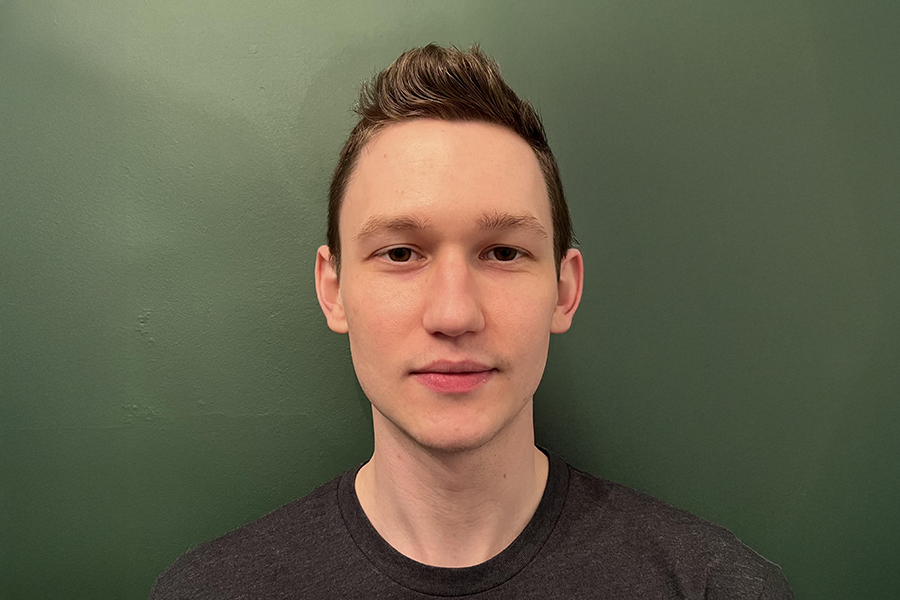Alumni Spotlight: Darian Shump

Darian Shump is a Florida State University College of Arts and Sciences alumnus who earned a master’s in history and ethnography of religions in 2019 from the Department of Religion. After graduation, he began working with Rensselaer Polytechnic Institute’s Center of Excellence in Digital Game Development, in Troy, New York, which became a catalyst for a career pivot. He currently works for Rushdown Studios, a game developer in Saratoga Springs, New York, as its acting hiring lead, using project management tactics, interviewing skills and multitasking abilities honed at FSU.
Tell us a little about your background.
I’m originally from Jacksonville, Florida. After graduating in 2014 from Stetson University in Deland, Florida, I went straight into a master’s at Vanderbilt in Nashville, Tennessee, then returned to Florida for a gap year and landed in Tallahassee. At the time, I had friends in the FSU religion department, and I’d met some of the religion faculty at its annual grad student conference. I knew all along I would apply –– luckily, it worked out!
Why did you study religion?
While at Stetson, I attended a conference at the United States Military Academy at West Point, New York. An attendee introduced me to the Uyghur people, a Muslim ethnic group in northwestern China, and I studied them nonstop through my senior research project. I was fascinated by how religion factored into Uyghur identity and how that related to ongoing resistance against the Chinese government’s repression of the Uyghur population.
How did you transition to the games industry?
The experiences I gained teaching courses at FSU prepared me for my job at RPI, where I worked adjacent to its game development program. As a TA and instructor at FSU, I prioritized engaging with students and their classroom success, which lent itself well to my job at RPI. Although I wasn’t teaching there, I tried to be someone students could go to for resources and assistance. That job sparked my interest in the games industry, helped me make connections, and landed me where I am today.
What’s it like to work as an associate producer and acting hiring lead at Rushdown Studios?
My first job in the games industry was at Rocket Science Group, a co-development game studio, but I moved over to Rushdown Studios at the start of this year. I split my time among project management work, general studio operations and recruitment-related tasks. Prioritizing and juggling multiple responsibilities, like building a recruitment pipeline, is a lot of what I do, and I attribute this success to the transferrable skills I learned managing and teaching large classes as a TA at FSU. A lot of my strengths in interviewing candidates come from my experiences working with students.
What do you enjoy most about your job?
The games industry is full of brilliant artists, animators, software engineers and other designers of all stripes. At Rushdown, we have an outstanding team with a super-supportive culture that encourages us to share knowledge and lean on each other for help.
We’re also a co-development studio, which means we do work for other game studios. We get to encounter more games than a traditional studio, which might spend anywhere from two to five years –– or more –– working on a single game. I love seeing the aspects of game creation come together behind the scenes.
Even though you changed industries, you’ve held onto your research focus. Tell us about that.
Since 2022, I’ve published two book chapters. The first was a chapter on NBC’s “Constantine” TV series in 2023 for “Theology and the DC Universe,” which I worked on during the pandemic.
Then in 2024, Erin Williams and I co-authored a chapter on The Witcher 3, one of our favorite games, for an edited volume called “The Witcher and Philosophy.” I was just getting into the industry and really starting to think critically about making games, which made writing fun.
Tell us about a memorable experience during your time at FSU.
My master’s adviser and professor of religion Adam Gaiser, whose research focuses on Ibadism –– Muslims hailing from the earliest period of Islamic history who are neither Sunni nor Shia –– taught me Arab-style archery. Before the pandemic, we’d practice the traditional thumb draw, where the thumb pulls the string of a bow back instead of three fingers. When I left FSU, Gaiser gave me one of his recurve bows, and I still have it. I’ve been looking for a range in New York where I can finally use it again.
Are there any faculty or staff members who inspired you?
Gaiser always gave me room to figure things out myself while providing help when I needed it; I didn’t want someone to hold my hand through my master’s, but I did want support, especially for more in-depth research. He struck a good balance on that front, which set me up for success at Rushdown.
I also had great experiences with John F. Priest Professor of Religion Bryan Cuevas. In one of our last conversations, he told me about his work outside of academia. He explained that academia will prepare you for anything. That’s what I’ve experienced professionally –– once you learn to juggle coursework, teaching and research, everything else feels easier.
What are some upcoming goals you’re working toward?
I’m hoping to present and share my recruitment experiences at the annual Game Developers Conference. I’d like to give advice to early-career individuals, people trying to get into the games industry, or those in the industry who’ve been laid off.
What is your advice for current students?
Although networking can be tough, building connections with the people around you is equally as important as a solid cover letter or résumé.
Taking time for yourself is also important. I’ve met many students with their nose to the grindstone –– me in college –– but it’s okay to dial back a little, spend time with friends and enjoy your life.
